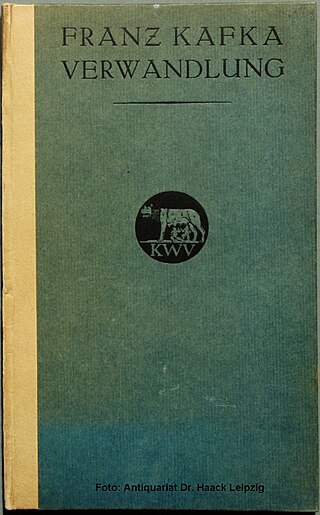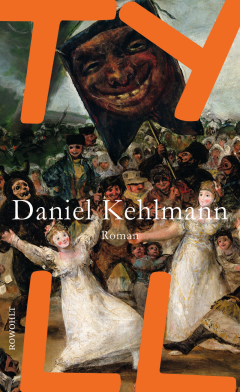Related Research Articles

Franz Kafka was a German-speaking Bohemian novelist and short-story writer based in Prague, who is widely regarded as one of the major figures of 20th-century literature. His work fuses elements of realism and the fantastic. It typically features isolated protagonists facing bizarre or surrealistic predicaments and incomprehensible socio-bureaucratic powers. It has been interpreted as exploring themes of alienation, existential anxiety, guilt, and absurdity. His best known works include the novella The Metamorphosis and novels The Trial and The Castle. The term Kafkaesque has entered English to describe absurd situations like those depicted in his writing.

Metamorphosis is a novella written by Franz Kafka and first published in 1915. One of Kafka's best-known works, Metamorphosis tells the story of salesman Gregor Samsa, who wakes one morning to find himself inexplicably transformed into a huge insect and subsequently struggles to adjust to this new condition. The novella has been widely discussed among literary critics, who have offered varied interpretations. In popular culture and adaptations of the novella, the insect is commonly depicted as a cockroach.

German literature comprises those literary texts written in the German language. This includes literature written in Germany, Austria, the German parts of Switzerland and Belgium, Liechtenstein, Luxembourg, South Tyrol in Italy and to a lesser extent works of the German diaspora. German literature of the modern period is mostly in Standard German, but there are some currents of literature influenced to a greater or lesser degree by dialects.

The Castle is the last novel by Franz Kafka. In it a protagonist known only as "K." arrives in a village and struggles to gain access to the mysterious authorities who govern it from a castle supposedly owned by Count Westwest.

Alexander Lernet-Holenia was an Austrian poet, novelist, dramaturgist and writer of screenplays and historical studies who produced a heterogeneous literary opus that included poetry, psychological novels describing the intrusion of otherworldly or unreal experiences into reality, and recreational films. He was born and died in Vienna.
The Kleist Prize is an annual German literature prize. The prize was first awarded in 1912, on the occasion of the hundredth anniversary of the death of Heinrich von Kleist. The Kleist Prize was the most important literary award of the Weimar Republic, but was discontinued in 1933.
Austrian literature is mostly written in German, and is closely connected with German literature.
Michael Hofmann is a German-born poet, translator, and critic. The Guardian has described him as "arguably the world's most influential translator of German into English".

Anthea Bell was an English translator of literary works, including children's literature, from French, German and Danish. These include The Castle by Franz Kafka, Austerlitz by W. G. Sebald, the Inkworld trilogy by Cornelia Funke and the French Asterix comics with co-translator Derek Hockridge.

Daniel Kehlmann is a German-language novelist and playwright of both Austrian and German nationality.

Franz Kafka, a German-language writer of novels and short stories who is regarded by critics as one of the most influential authors of the 20th century, was trained as a lawyer and later employed by an insurance company, writing only in his spare time.
Michael Wood is professor emeritus of English at Princeton University. He is a literary and cultural critic, and an author of critical and scholarly books as well as a writer of reviews, review articles, and columns.

Michael Maar is a German literary scholar, germanist and author.

Ventseslav Konstantinov was a Bulgarian writer, aphorist and translator of German and English literature.
The Heimito von Doderer-Literaturpreis was established in 1996 to commemorate the 100th birthday of Heimito von Doderer. It was created as a memorial to "one of the most important writers of the 20th century", and to honor a single work or life work of a contemporary writer who excels in "language of high sensitivity and originality in the tradition of Doderer.
The Schlegel-Tieck Prize for German Translation is a literary translation award given by the Society of Authors in London. Translations from the German original into English are considered for the prize. The value of the prize is £3,000. The prize is named for August Wilhelm Schlegel and Ludwig Tieck, who translated Shakespeare to German in the 19th century.
Philip Boehm is an American playwright, theater director and literary translator. Born in Texas, he was educated at Wesleyan University, Washington University in St. Louis, and the State Academy of Theater in Warsaw, Poland.
Thomas Pletzinger is a German writer and translator. He is best known for his debut novel Bestattung eines Hundes, which was published in 2008 to wide acclaim. It has been translated into English as Funeral for a Dog. Pletzinger served as the writer-in-residence in the German department at Grinnell College in 2010 and again in 2014.

Clemens J. Setz is an Austrian writer and translator.

Tyll is a 2017 novel, originally written in German, by the Austrian-German writer Daniel Kehlmann. The book is based, in part, on the folkloristic tales about Till Eulenspiegel, a jester who was the subject of a chapbook in 16th century Germany, as well as on the history of the Thirty Years' War. The book was first published in October 2017 in the original German by Rowohlt Verlag. An English translation by Ross Benjamin was published in the United States by Pantheon Books, a division of Penguin Random House, New York, in February 2020. Between its initial publication in 2017, and its publication in English, Tyll had sold almost 600,000 copies in Germany.